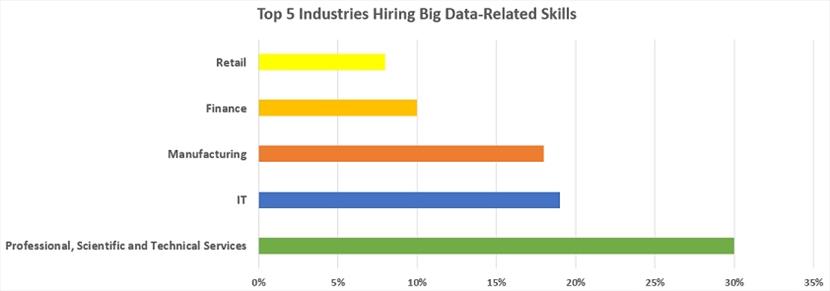| |
The rapid increase in the number of internet users around the world has
elevated the importance of big data in the organizational structure. It is not a
buzzword anymore, but a highly important source of success in the coming years.
According to Forbes, big data has become a movement that is driving
organizational decisions like never before. The vast amount of data produced and
used to drive insights in real-time is changing the scenario or industrial
operations.
An IDC forecast suggests that by the end of this year the valuation of big data
is likely to cross over 150.8 billion dollars. Moreover, the growth will
continue with a CAGR of 11.5 per cent reaching 210 billion dollars by 2020. The
growth of enterprise from now onwards will be determined by how effectively they
harness the potential that big data has to offer, which will be mainly dependent
on the availability of skilled resources in these enterprises. So, if you wish
to be a part of this growing market, you can improve your data analytics skill
by taking a
SAS course in Delhi. You can choose training centers like PST analytics and
find yourself amongst the company of the data analytics industry’s best.
Big Data Jobs in the Coming Years
According to
Forbes, industries are rushing to hire people who have good
analytical skills to drive insights from big data. The top amongst them are
technical services, IT, manufacturing, retail and finance industry.

The requirement of analysts in these industries differ from each other. However,
the overall growth is soaring through the roof. The increase in requirement of
big data professionals like:
| Profession |
% growth in requirement |
| |
|
| Management Analysts |
162.92 |
| IT Project Managers |
122.51 |
| Information Security Analysts |
278.69 |
| System Analyst |
142.13 |
| Software Developers |
94.86 |
Jobs in Big Data Analytics and their Roles
Chief Data Officer
A chief data officer (CDO) is responsible for driving the data analytics
department’s vision, strategies and their proper execution. They ensure proper
functioning of the department including enabling sustainable growth and
profitability of the businesses. Moreover, the CDO provides oversights to
support implementations through the Enterprise Information Management (EIM)
program and coordinates with the CIO/CTO.
Skills Required – A CDO must be highly skilled in designing,
developing and validating all predictive, descriptive, prescriptive and applied
analytics. The candidate should be proficient in using data tools and
technologies like SQL, Hadoop, PostgreSQL, Teradata, Redshift and programming
languages like SAS, Python and R.
Salary: On an average, a CDO’s pay scale ranges more than 18
lakhs annually.
MIS Reporting Executive
Business managers rely highly on Management Information System reports to check
progress, make real-time decisions to identify and solve problems. The
executives provide managers with reports that collate the information of
business such as revenue of sales, product inventories and customer service
calls which are forwarded to the stakeholders.
Skills Required: The MIS reporting executive must have a degree
in either Computer Science Engineering, information systems or financial
analysis. They must also have good skills in MS Office, PIVOT, Hlookup, Data
Programs, Countif and VLookup.
Salary: The average base salary of MIS executive is roughly
around 6.2 lakhs annually.
Business Analyst
Many of us think that this job is similar to that of data analyst, but it's not.
Business analysts are experts in the domain they work. They provide solutions to
business managers based on technology and data analysis to enhance distribution
and productivity. Enterprises need these analysts for various things like gap
analysis, knowledge transfer to developers, test preparation, software
documentation among others.
Skills Required: Business analysts must have a degree in
business administration. They should also have a good knowledge of data
visualization tools like Tableau and requisite IT domains, which includes
programming and database management.
Salary: Average Salary of the business analyst is up to 8.62
lakhs annually.
Data Architect
Data architects are the people who design, build and manage the big data
infrastructure. They ensure that the enterprise’s big data ecosystem runs
without any glitches for data scientists to carry out the analysis.
Skills Required: Data architects should be computer engineers
with knowledge of Hadoop, MySQL, Pig, SQL, MapReduce, Data Streaming, and
programming. They must also be proficient in SAS, C++, Java, Python, R and
Matlab.
Salary: Average salary of data architect is up to 10.4 lakhs
dollars annually.
Big Data Engineer
The role of data engineer is to build what data architect designs. They
configure, use and program solutions for big data which can be used in business.
The engineers use various open source tools to build highly scalable distributed
systems.
Skills Required: The big data engineers should know the basics
of data structures, algorithms, distributed computing, Hadoop cluster
management, stream process solutions like Spark and Storm. They should also know
how to use big data tools like Impala, Hive, Pig, NoSQL databases, Frameworks
like Flume and ETL tools and big data toolkits.
Salary: Average salary of data engineer is up to 7.5 lakhs annually.
The requirements of skilled resources who can utilize big data to its best are
increasing rapidly. Enterprises are willing to pay premium salaries to
professionals who can help them derive insights by analyzing big data. So, if
you are looking to enter the world of data analytics, improve the one skill that
is wanted in every analytics job – good knowledge of SAS. You can learn this
skill by taking a SAS course in Delhi and learn everything to become an expert
in SAS.
|
